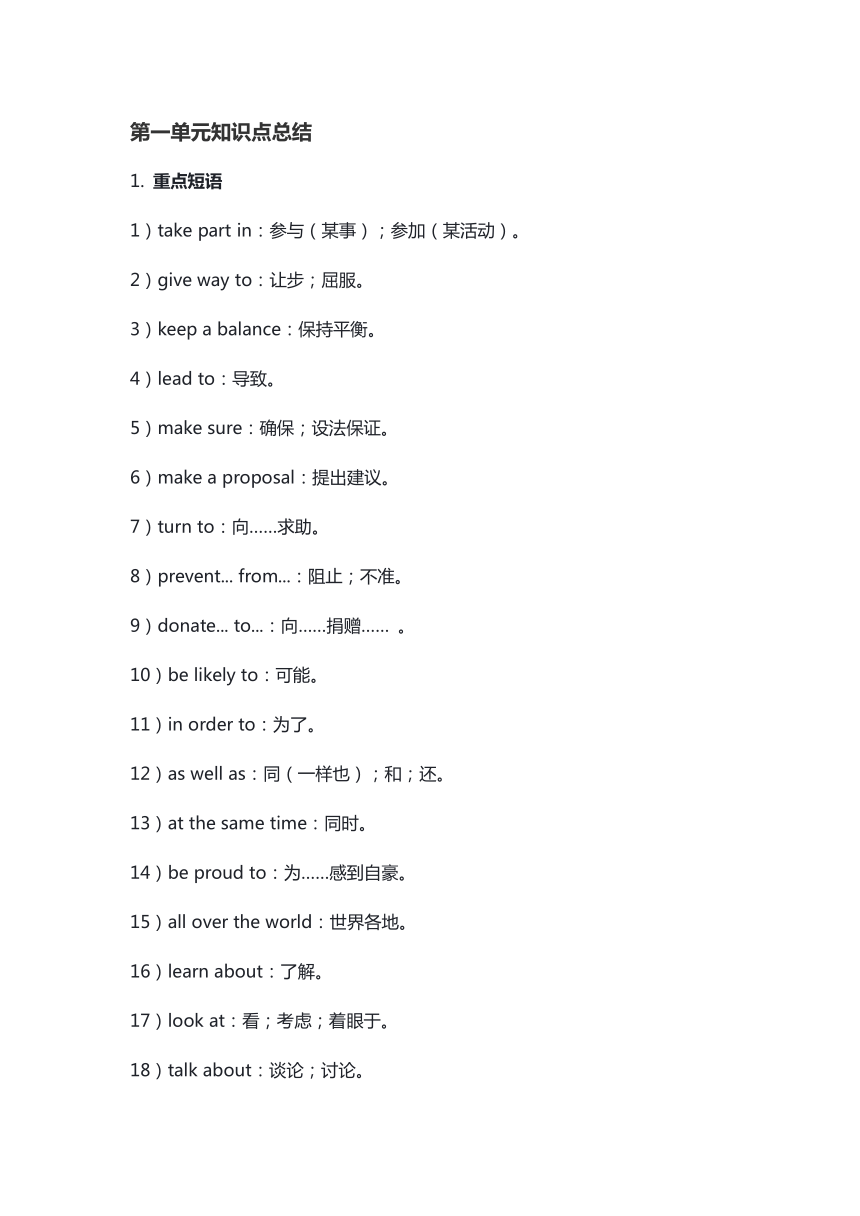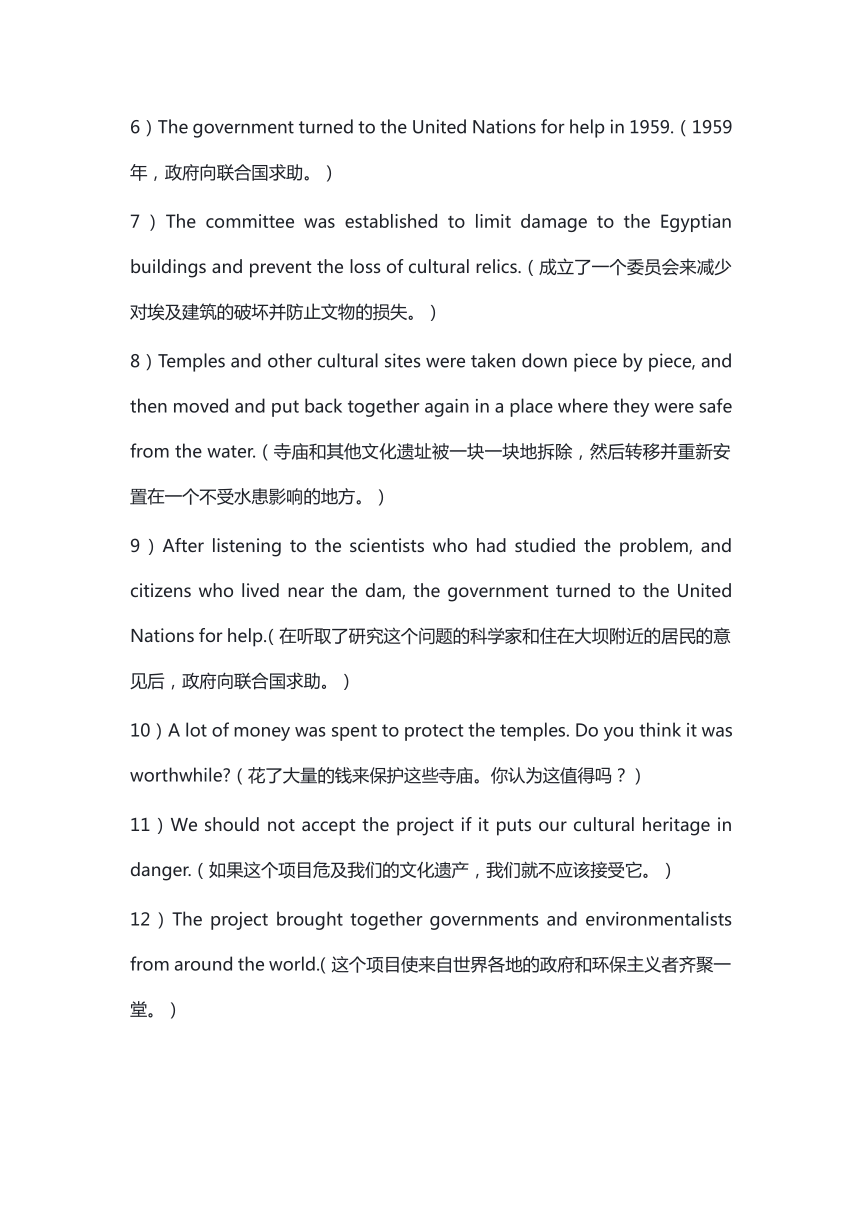Unit 1 Cultural Heritage知识点清单(讲义) 2024-2025学年高中英语人教版必修第二册
文档属性
| 名称 | Unit 1 Cultural Heritage知识点清单(讲义) 2024-2025学年高中英语人教版必修第二册 |

|
|
| 格式 | docx | ||
| 文件大小 | 21.2KB | ||
| 资源类型 | 教案 | ||
| 版本资源 | 人教版(2019) | ||
| 科目 | 英语 | ||
| 更新时间 | 2025-02-16 00:00:00 | ||
图片预览



文档简介
第一单元知识点总结
1. 重点短语
1)take part in:参与(某事);参加(某活动)。
2)give way to:让步;屈服。
3)keep a balance:保持平衡。
4)lead to:导致。
5)make sure:确保;设法保证。
6)make a proposal:提出建议。
7)turn to:向……求助。
8)prevent... from...:阻止;不准。
9)donate... to...:向……捐赠…… 。
10)be likely to:可能。
11)in order to:为了。
12)as well as:同(一样也);和;还。
13)at the same time:同时。
14)be proud to:为……感到自豪。
15)all over the world:世界各地。
16)learn about:了解。
17)look at:看;考虑;着眼于。
18)talk about:谈论;讨论。
19)use... to...:用……去…… 。
20)be interested in:对……感兴趣。
2. 重点句型
1)There comes a time when the old must give way to the new, and it is not possible to preserve everything from our past as we move towards the future.(新旧更替的时代已经到来,在走向未来的过程中,我们不可能将过去的一切都保存下来。)
2)Not only had the countries found a path to the future that did not run over the relics of the past, but they had also learnt that it was possible for countries to work together to build a better tomorrow.(这些国家不仅找到了一条不以牺牲古迹为代价的未来发展之路,而且明白了多个国家合作创造美好未来的可能性。)
3)By sharing so many digital photos over the Internet, the group hopes to promote even wider interest around the world in China’s ancient history, culture, and traditions.(这些科学家和研究者在网络上分享了大量有关莫高窟的电子照片,希望在世界范围内促使人们对中国古代历史和文化习俗产生更广泛的兴趣。)
4)It was a time when people could get a lot of information from the Internet.(这是一个可以从互联网上获得大量信息的时代。)
5)The company finally gave way to the customer’s complaints.(面对顾客的投诉,公司最终还是让步了。)
6)The government turned to the United Nations for help in 1959.(1959年,政府向联合国求助。)
7)The committee was established to limit damage to the Egyptian buildings and prevent the loss of cultural relics.(成立了一个委员会来减少对埃及建筑的破坏并防止文物的损失。)
8)Temples and other cultural sites were taken down piece by piece, and then moved and put back together again in a place where they were safe from the water.(寺庙和其他文化遗址被一块一块地拆除,然后转移并重新安置在一个不受水患影响的地方。)
9)After listening to the scientists who had studied the problem, and citizens who lived near the dam, the government turned to the United Nations for help.(在听取了研究这个问题的科学家和住在大坝附近的居民的意见后,政府向联合国求助。)
10)A lot of money was spent to protect the temples. Do you think it was worthwhile (花了大量的钱来保护这些寺庙。你认为这值得吗?)
11)We should not accept the project if it puts our cultural heritage in danger.(如果这个项目危及我们的文化遗产,我们就不应该接受它。)
12)The project brought together governments and environmentalists from around the world.(这个项目使来自世界各地的政府和环保主义者齐聚一堂。)
13)The spirit of the Aswan Dam project is still alive today.(阿斯旺大坝项目的精神今天依然存在。)
14)Perhaps the best example is shown by UNESCO, which runs a programme that prevents world cultural heritage sites around the world from disappearing.(也许最好的例子是联合国教科文组织,它开展了一个项目来防止世界各地的世界文化遗产消失。)
15)When the project ended in 1980, it was considered a great success.(1980年项目结束时,它被认为是一个巨大的成功。)
16)We must make people aware of the problem and help the endangered wildlife before it’s too late!(我们必须让人们意识到这个问题,并在为时已晚之前帮助濒危野生动物!)
17)The air is thin and we have to rest several times on the short hike from camp.(空气稀薄,我们在从营地出发的短途徒步旅行中不得不休息几次。)
18)To our left, snow - covered mountains disappear into clouds that seem almost close enough to touch.(在我们左边,白雪皑皑的山脉消失在似乎近在咫尺的云层中。)
19)Watching them move slowly across the green grass, I’m struck by their beauty.(看着它们在绿草地上缓缓移动,我被它们的美丽所打动。)
20)I’m also reminded of the danger they were in.(我也想起了它们所处的危险。)
21)They were hunted, illegally, for their valuable fur.(它们因珍贵的皮毛而遭到非法捕猎。)
22)The reserve is a shelter for the animals and plants of northwestern Xizang.(这个保护区是西藏西北部动植物的庇护所。)
23)To Zhaxi, the land is sacred and protecting the wildlife is a way of life.(对扎西来说,这片土地是神圣的,保护野生动物是一种生活方式。)
24)The 1980s and 1990s were bad times for the Tibetan antelope.(20世纪80年代和90年代对藏羚羊来说是艰难的时期。)
25)The population dropped by more than 50 percent.(藏羚羊的数量下降了超过50%。)
26)Hunters were shooting antelopes to make profits.(猎人射杀藏羚羊以获取利润。)
27)Their habitats were becoming smaller as new roads and railways were built.(随着新公路和铁路的修建,它们的栖息地变得越来越小。)
28)In order to save this species from extinction, the Chinese government placed it under national protection.(为了拯救这个物种免于灭绝,中国政府将其列为国家保护动物。)
29)Zhaxi and other volunteers watched over the antelopes to keep them safe from cars and trains.(扎西和其他志愿者守护着藏羚羊,保护它们免受汽车和火车的伤害。)
30)The measures were effective.(这些措施是有效的。)
3. 重点语法:限制性定语从句(3)
1)在much或all后用that,不用which,作定语从句的宾语时可以省略。例如:There was not much that we could do when it was raining.(下雨时我们能做的不多。 )
2)关系代词作动词的间接宾语时,用to或for。例如:Who is the girl that he gave the flower to (他把花给了哪个女孩?)
3)正式英语中,介词可置于从句之首,whom或which之前,但介词不可置于who或that之前。例如:This is the great writer to whom our teacher was referring.(这就是我们老师提到的那位伟大作家。)
4)定语从句的谓语如果是以介词结尾的短语动词,则不可把介词移至从句之首。例如:He received the email he was looking forward to.(他收到了他期待的电子邮件。)
1. 重点短语
1)take part in:参与(某事);参加(某活动)。
2)give way to:让步;屈服。
3)keep a balance:保持平衡。
4)lead to:导致。
5)make sure:确保;设法保证。
6)make a proposal:提出建议。
7)turn to:向……求助。
8)prevent... from...:阻止;不准。
9)donate... to...:向……捐赠…… 。
10)be likely to:可能。
11)in order to:为了。
12)as well as:同(一样也);和;还。
13)at the same time:同时。
14)be proud to:为……感到自豪。
15)all over the world:世界各地。
16)learn about:了解。
17)look at:看;考虑;着眼于。
18)talk about:谈论;讨论。
19)use... to...:用……去…… 。
20)be interested in:对……感兴趣。
2. 重点句型
1)There comes a time when the old must give way to the new, and it is not possible to preserve everything from our past as we move towards the future.(新旧更替的时代已经到来,在走向未来的过程中,我们不可能将过去的一切都保存下来。)
2)Not only had the countries found a path to the future that did not run over the relics of the past, but they had also learnt that it was possible for countries to work together to build a better tomorrow.(这些国家不仅找到了一条不以牺牲古迹为代价的未来发展之路,而且明白了多个国家合作创造美好未来的可能性。)
3)By sharing so many digital photos over the Internet, the group hopes to promote even wider interest around the world in China’s ancient history, culture, and traditions.(这些科学家和研究者在网络上分享了大量有关莫高窟的电子照片,希望在世界范围内促使人们对中国古代历史和文化习俗产生更广泛的兴趣。)
4)It was a time when people could get a lot of information from the Internet.(这是一个可以从互联网上获得大量信息的时代。)
5)The company finally gave way to the customer’s complaints.(面对顾客的投诉,公司最终还是让步了。)
6)The government turned to the United Nations for help in 1959.(1959年,政府向联合国求助。)
7)The committee was established to limit damage to the Egyptian buildings and prevent the loss of cultural relics.(成立了一个委员会来减少对埃及建筑的破坏并防止文物的损失。)
8)Temples and other cultural sites were taken down piece by piece, and then moved and put back together again in a place where they were safe from the water.(寺庙和其他文化遗址被一块一块地拆除,然后转移并重新安置在一个不受水患影响的地方。)
9)After listening to the scientists who had studied the problem, and citizens who lived near the dam, the government turned to the United Nations for help.(在听取了研究这个问题的科学家和住在大坝附近的居民的意见后,政府向联合国求助。)
10)A lot of money was spent to protect the temples. Do you think it was worthwhile (花了大量的钱来保护这些寺庙。你认为这值得吗?)
11)We should not accept the project if it puts our cultural heritage in danger.(如果这个项目危及我们的文化遗产,我们就不应该接受它。)
12)The project brought together governments and environmentalists from around the world.(这个项目使来自世界各地的政府和环保主义者齐聚一堂。)
13)The spirit of the Aswan Dam project is still alive today.(阿斯旺大坝项目的精神今天依然存在。)
14)Perhaps the best example is shown by UNESCO, which runs a programme that prevents world cultural heritage sites around the world from disappearing.(也许最好的例子是联合国教科文组织,它开展了一个项目来防止世界各地的世界文化遗产消失。)
15)When the project ended in 1980, it was considered a great success.(1980年项目结束时,它被认为是一个巨大的成功。)
16)We must make people aware of the problem and help the endangered wildlife before it’s too late!(我们必须让人们意识到这个问题,并在为时已晚之前帮助濒危野生动物!)
17)The air is thin and we have to rest several times on the short hike from camp.(空气稀薄,我们在从营地出发的短途徒步旅行中不得不休息几次。)
18)To our left, snow - covered mountains disappear into clouds that seem almost close enough to touch.(在我们左边,白雪皑皑的山脉消失在似乎近在咫尺的云层中。)
19)Watching them move slowly across the green grass, I’m struck by their beauty.(看着它们在绿草地上缓缓移动,我被它们的美丽所打动。)
20)I’m also reminded of the danger they were in.(我也想起了它们所处的危险。)
21)They were hunted, illegally, for their valuable fur.(它们因珍贵的皮毛而遭到非法捕猎。)
22)The reserve is a shelter for the animals and plants of northwestern Xizang.(这个保护区是西藏西北部动植物的庇护所。)
23)To Zhaxi, the land is sacred and protecting the wildlife is a way of life.(对扎西来说,这片土地是神圣的,保护野生动物是一种生活方式。)
24)The 1980s and 1990s were bad times for the Tibetan antelope.(20世纪80年代和90年代对藏羚羊来说是艰难的时期。)
25)The population dropped by more than 50 percent.(藏羚羊的数量下降了超过50%。)
26)Hunters were shooting antelopes to make profits.(猎人射杀藏羚羊以获取利润。)
27)Their habitats were becoming smaller as new roads and railways were built.(随着新公路和铁路的修建,它们的栖息地变得越来越小。)
28)In order to save this species from extinction, the Chinese government placed it under national protection.(为了拯救这个物种免于灭绝,中国政府将其列为国家保护动物。)
29)Zhaxi and other volunteers watched over the antelopes to keep them safe from cars and trains.(扎西和其他志愿者守护着藏羚羊,保护它们免受汽车和火车的伤害。)
30)The measures were effective.(这些措施是有效的。)
3. 重点语法:限制性定语从句(3)
1)在much或all后用that,不用which,作定语从句的宾语时可以省略。例如:There was not much that we could do when it was raining.(下雨时我们能做的不多。 )
2)关系代词作动词的间接宾语时,用to或for。例如:Who is the girl that he gave the flower to (他把花给了哪个女孩?)
3)正式英语中,介词可置于从句之首,whom或which之前,但介词不可置于who或that之前。例如:This is the great writer to whom our teacher was referring.(这就是我们老师提到的那位伟大作家。)
4)定语从句的谓语如果是以介词结尾的短语动词,则不可把介词移至从句之首。例如:He received the email he was looking forward to.(他收到了他期待的电子邮件。)
